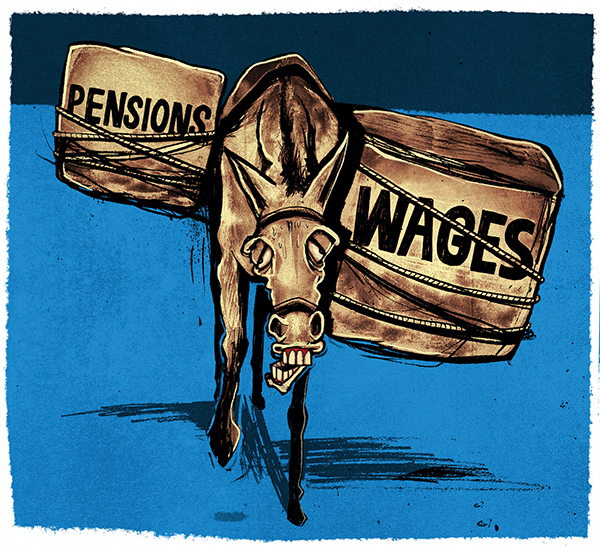Editorial: At least that’s the message from UK plc, which is sounding off about the detrimental impact of the living wage coming into force next April.
From next year the pay floor will be rising to £7.20 an hour for those aged over 25, up from the minimum wage for over 21s, which will become £6.70 from October 1.
Neither sound like particularly heady sums, but it is feared that this 7.5 per cent hike will heap a great deal of pressure on employers, particularly those with high levels of low-paid workers, such as retailers.
And it will get worse, as that minimum will be required to rise to £9 by 2020. Doing the right thing can be expensive sometimes.
While there were some initial grumblings from business associations when George Osborne announced the plans in the summer Budget, the true severity of the change is only just starting to become clear.

Illustration by Ben Jennings
The CBI’s president spoke in the Financial Times on Tuesday about the “dramatic impact” the change would have on companies’ bottom lines, a hit that he said had been underestimated by government.
The issue has been compounded by the fact that companies could have to up the pay of all employees in order to ensure appropriate pay differentials remain in tact.
And as the industry body’s head of pensions told us last week, “the money has to come from somewhere”.
So where might a struggling employer look to mitigate some of these added costs? You can see where I’m going with this.
Pensions is one avenue already being explored by some businesses, according to the CBI, along with raising prices for their goods and services.
On Twitter, Mike Morrison (@AJBellMike) responded to our story on how the minimum wage threatened employer contributions by pointing out: “If employers have a budget for employees & one bit goes up something has to give.”
But, pessimistically perhaps, he cited another sad potential aspect of this scenario: the continued chipping away at the tax-free allowances of the top brass’s own pensions could make it more likely for CEOs to trim employer contributions with less remorse than they might have had before.
The full knock-on effects of the living wage on pension provision will be complex and dependent on whether that employer is small, large, staging or re-enrolling – and whether they operate in a sector that is able to cushion the blow in another way.
Maxine Kelly is editor at Pensions Expert. You can follow her on Twitter @MaxineEK and the team @pensions_expert

















